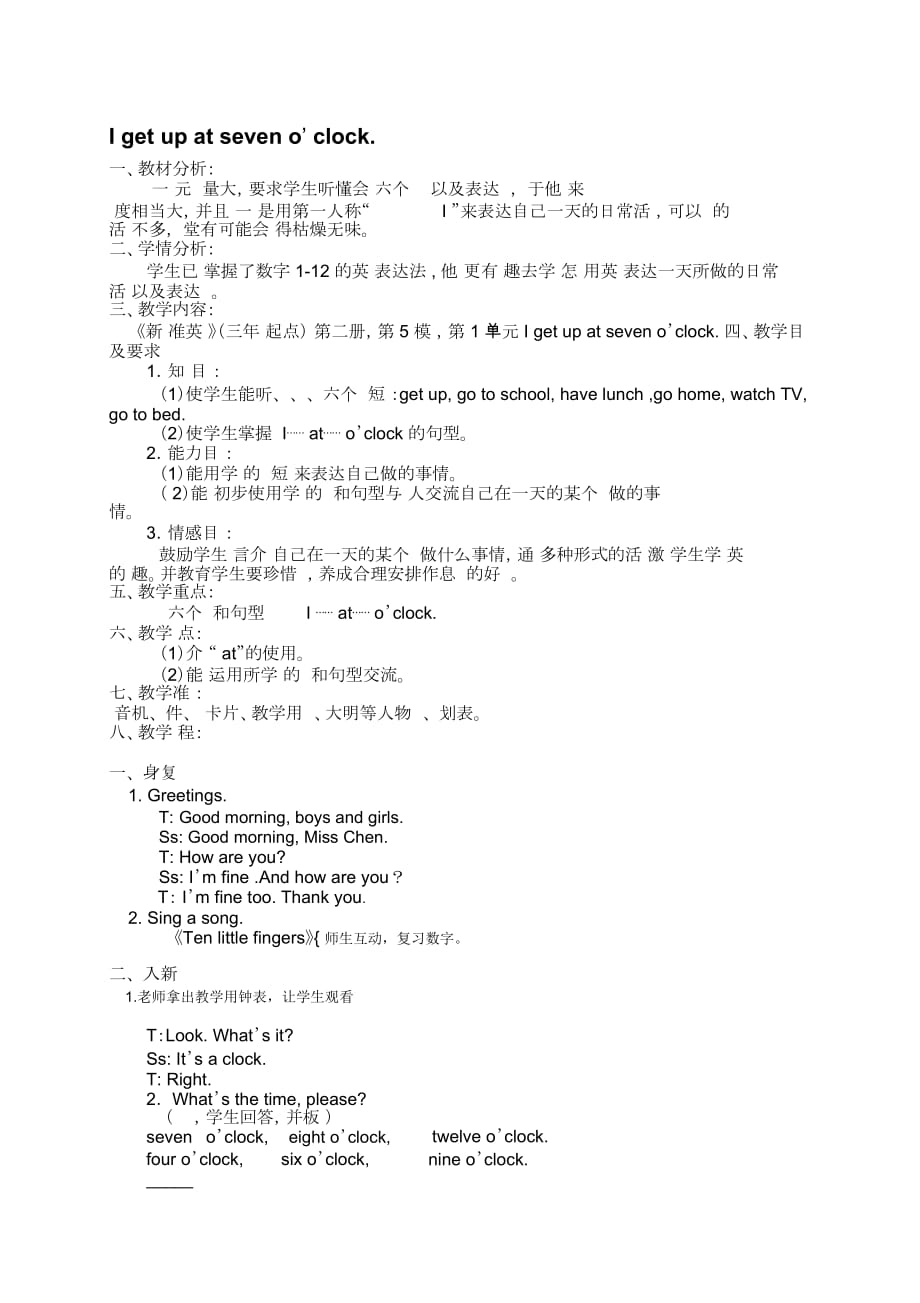《I_get_up_at_seven_o’clock教學(xué)設(shè)計(jì)》由會(huì)員分享�,可在線閱讀����,更多相關(guān)《I_get_up_at_seven_o’clock教學(xué)設(shè)計(jì)(3頁(yè)珍藏版)》請(qǐng)?jiān)谘b配圖網(wǎng)上搜索。
1�、
I get up at seven o’ clock.
一、教材分析:
一 元 量大���,要求學(xué)生聽(tīng)懂會(huì) 六個(gè) 以及表達(dá) ��, 于他 來(lái)
度相當(dāng)大�����,并且 一 是用第一人稱(chēng)“ I ”來(lái)表達(dá)自己一天的日?�;?����,可以 的
活 不多����, 堂有可能會(huì) 得枯燥無(wú)味。
二��、學(xué)情分析:
學(xué)生已 掌握了數(shù)字 1-12 的英 表達(dá)法 , 他 更有 趣去學(xué) 怎 用英 表達(dá)一天所做的日?��;?以及表達(dá) �。
三��、教學(xué)內(nèi)容:
《新 準(zhǔn)英 》(三年 起點(diǎn)) 第二冊(cè)�����,第 5 模 ,第 1 單元 I get up at seven o’clock.
2���、四��、教學(xué)目 及要求
1.知 目 :
(1)使學(xué)生能聽(tīng)���、 、 ���、 六個(gè) 短 :get up, go to school, have lunch ,go home, watch TV, go to bed.
(2)使學(xué)生掌握 I?? at?? o’clock 的句型�����。
2.能力目 :
(1)能用學(xué) 的 短 來(lái)表達(dá)自己做的事情�����。
( 2)能 初步使用學(xué) 的 和句型與 人交流自己在一天的某個(gè) 做的事
情�。
3.情感目 :
鼓勵(lì)學(xué)生 言介 自己在一天的某個(gè) 做什么事情����,通 多種形式的活 激 學(xué)生學(xué) 英 的 趣�。并教育學(xué)生要珍惜 �����,養(yǎng)成合理安排作息
3�����、 的好 �。
五��、教學(xué)重點(diǎn):
六個(gè) 和句型 I ?? at?? o’clock.
六�、教學(xué) 點(diǎn):
(1)介 “ at”的使用。
(2)能 運(yùn)用所學(xué) 的 和句型交流����。
七、教學(xué)準(zhǔn) :
音機(jī)�、 件、 卡片����、教學(xué)用 、大明等人物 ����、 劃表����。
八����、教學(xué) 程:
一、 身復(fù)
1. Greetings.
T: Good morning, boys and girls. Ss: Good morning, Miss Chen.
T: How are you?
Ss: I’m fine .And how are you��?
4��、
T: I’m fine too. Thank you.
2. Sing a song.
《Ten little fingers》{ 師生互動(dòng)��,復(fù)習(xí)數(shù)字���。
二�、 入新
1.老師拿出教學(xué)用鐘表�,讓學(xué)生觀看
T:Look. What’s it?
Ss: It’s a clock.
T: Right.
2. What’s the time, please?
( ,學(xué)生回答����,并板 )
seven o’clock, eight o’clock,
four o’clock, six o’clock,
�
t
5、welve o’clock.
nine o’clock.
_____
3. T: Read it together.
三、學(xué)習(xí)新知
1.(課件: Miss Chen 正在吃晚餐)
T: Look, this is Miss Chen. I’m having dinner.(引導(dǎo)學(xué)生說(shuō)出 have dinner)
(點(diǎn)擊課件:出現(xiàn)鐘)
T: What’s the time, please?
Ss: It’s seven o’clock.
T: I have dinner at seven o’clock.
板書(shū) : I have
6����、 dinner at seven o’clock.(根據(jù)手指的節(jié)奏讀句子)
2.Read after the teacher. Pay attention to“at”
3.T: Today, we’re going to learn some phrases.
(1) get up
T: Look and guess. It’sseven o’clock. I should_ _____.
read after the teacher up up get up(肢體語(yǔ)言 ) 大小聲 Look and say. (老師做嘴形) I get up at seven o’clock.
7、
T: Listen, what time does Daming get up? Who can repeat? Ss: I get up at seven ’oclock.
(2) go to school
T: What time do you go to school?
讓學(xué)生自己說(shuō)自己上學(xué)的時(shí)間音模仿���,發(fā)揮學(xué)生的主動(dòng)性讓學(xué)生聽(tīng)
(3) have lunch
T: It ’stwelve o’clock. I ’m hungry. It’s time for_________. 板書(shū): have lunch
Read aft
8�����、er the teacher (how many fingers how many times) one by one T: Listen and repeat.
I have lunch at twelve o’clock.
(4)go home
課件:(下課鈴聲 鐘表 4 點(diǎn))
T: What s’the time, please? It’s four o’clock. Let’s go home. 板書(shū): go home.
Read after the teacher (看卡片由小到大)
T: listen and repeat. Ss: I go home at fou
9�����、r o’clock.
(5) watch TV
T: Listen then repeat. S1: I watch TV at six o’clock.
板書(shū): watch TV
Card: watch TV read after the teacher with actions 看嘴形說(shuō): I watch TV at six o’clock.
(6)go to bed.
T: I’m tired. It ’s nine o’clock. It ’s time for me to go to bed. 板書(shū): go to bed.
Read after the
10、 teacher 看手勢(shì)讀單詞
T: listen then repeat S1: I go to bed at nine o’clock.
5.Read the phrases and sentences together.
四�、趣味操練
1.Game1
T: Let’s play a game. Look, It’s beautiful.
(點(diǎn)擊課件,出現(xiàn)海底世界) There are lots of fishes. But the shark wants to eat them.
If you can say the phrases. You can help th
11�����、e fish. Can you? Let’s begin.
2.Simon says的游戲���。
T: Simon says, get up, then do the action.
Get up, don’t do the action.
3. read the passage.
(1) T: Now, Let’shave a rest. Listen then repeat.
(2)Listen then read after the tape.
課文學(xué)習(xí)�,在學(xué)習(xí)的時(shí)候,對(duì)學(xué)生提出要求����,聽(tīng),指��,跟讀��,齊讀����,任務(wù)難度層層遞進(jìn)。
4.The se
12�����、ntence game.
I?? at?? o’clock 表達(dá)
( 件 出六 花�����,花上有不同的活 和 ����,學(xué)生必 用
出來(lái))
五、完成任
1. 每個(gè)學(xué)生一 劃表�, 出一 自己周末或上學(xué) 的 劃表����。
T: Take out your tables. Please finish it. Then use the sentence pattern I____ at
____o’clock/half past____. to report your daily life.
Activity get up go to schoo
13���、l have lunch go home watch TV go to bed
Time 時(shí)間
六��、小
1. How time flies! Please cherish time and work hard.
2. Which group is the winner?
3. End.
附板 :
Unit1 I get up at seven o’clock.
get up
seven o’clock.
I
go to school
eight o’clock.
have lunch
at
twelve o’clock.
go home
four o’clock.
watch TV
six o’clock.
go to bed
nine o’clock.
 I_get_up_at_seven_o’clock教學(xué)設(shè)計(jì)
I_get_up_at_seven_o’clock教學(xué)設(shè)計(jì)

